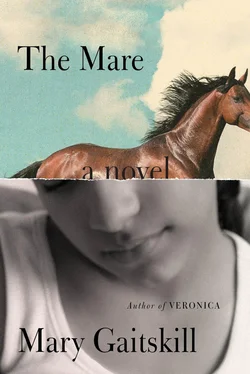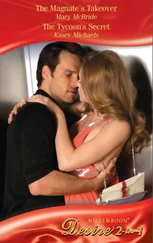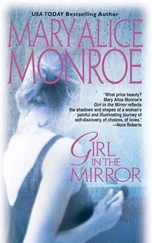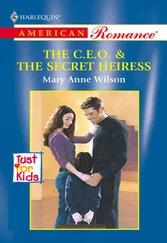“No,” I said. “No.”
“Wait,” he said and grabbed the phone, listening. “An agent is a person, it says it thinks I want to talk to an agent.” He told the phone, “Yes, agent, you puta,” and it answered him with music.
She was far away when she got ready for bed that night — she didn’t even smile when she asked if she could have her favorite towel with the pink flowers on it. Paul said, “She’s being amazing. Strong. Considering how disappointed she must be about her mother not coming.” “Yeah,” I said. You don’t know the half of it, I didn’t say. I called the translator, didn’t reach her. I hoped to God I hadn’t made a mistake in encouraging this.
The next morning she was still calm, but with something else too, something I could not define. “Velvet,” I said. “I know you can win this. I want you to win. But even if you don’t? You’ve still done something incredible to get this far. I’m more proud of you than I’ve ever been of anyone in my life.”
Normally when I would compliment her, she’d smile awkwardly and thank me with a full, tender voice. This time she thanked me with her voice and face so measured she looked like a much older person, almost middle-aged. Again I wondered if I had done the right thing. Was any of this right?
But after I walked her to the barn, I didn’t doubt. A girl with purple hair greeted Velvet warmly. “Is she competing too?” I asked. “No,” said Velvet. “She’s just coming to help.” I stayed long enough to watch her lead her horse out. The animal seemed to look at me like it knew me and was thinking something very specific. Velvet did not look at me, just at the horse.
It was on the walk home that I finally identified what it was: She looked like her mother. Like her mother the fighter. Except that, unlike her mother, she wasn’t in a tank. She was out in the open. I smiled. I knew: I had done the right thing.
I knew it even more when Paul greeted me on the porch, phone in his hand. “They’re coming,” he said. “Dante just called me.”
“When?” I asked. “It’s starting in like an hour!”
“That’s why he called, they wanted to know what time it was. I get the sense it was a last-minute decision. I told them I’m pick them up at Poughkeepsie because it won’t cost them as much that way.”
I don’t know why I felt glad they were coming. This whole thing — Ginger’s “project,” as Becca called it — had ruined my marriage, or allowed me to ruin it, and the ruin had just begun. What would happen to Ginger if we divorced? I imagined her in the city, living in a grimy studio in Queens or Brooklyn, maybe Crown Heights, trying to find a job (as what ?) and attempting to maintain a relationship with a family who’d most likely have no use for her — and I sped to Poughkeepsie as if to forestall that future, Polly hurling away from me like a rapidly cooling planet wrenched off its axis.
I got there early but couldn’t find a spot in the near lot, had to spiral up the parking structure for a space, thinking weirdly of Ginger’s sister, whom I had once compared, after her death, to the Nabokovian character Hazel Shade, an ugly girl who kills herself on being rejected by a cloddish boy. I did not make a direct comparison between live Melinda and the fictional dead girl for Ginger; I just repeated one critic’s somewhat quixotically made case that poor scorned Hazel is transformed by death into a Vanessa butterfly, a kind angel who gently guides her father into the spirit world and even comforts the egotistical lunatic (and great rejecter of women) who inadvertently drew her dad to his death.
I heard a train pulling in as I hurried down the concrete steps, feeling that strange gladness in anticipation of the lumpen, frowning woman and her odd boy whom I could deliver to my even more odd wife. Who had liked the connection between her sister and Hazel Shade because she felt that Melinda had guided her to Velvet and Velvet to the horse. And because she believed in transformation, she did not accept that anything just “is what it is”; she always thought it could be something else, something secretly beautiful and glorious.
I made myself visible at the foot of a main stairway, smiling expectantly as the last passengers left the train. My smile stiffened slightly; they did not seem to be there. I went to the other end of the platform, thinking they might be waiting for the elevator. But the conveyance was taking someone up, and I dropped the smile as I headed back up the stairs. “Pippa Passes”; Nabokov had used that poem wittily in connection with Hazel, Pippa being an insignificant girl who somehow transforms everyone around her into something better than they are. They weren’t upstairs either or in the lobby. Exasperated — this was so typical — I reached for my phone, calling as I walked outside, where insignificant people passed and passed.
He is a funny man, even if he doesn’t say anything funny, just the way his hairy uni-blond brows go together when he’s trying to think of what to say. Before my mom got her crazy idea of going upstate to open a can of whup-ass, this guy on South Park was saying, “Black is beautiful, tan is grand, but the white man is the big boss man!” And I thought of the eyebrows.
But at least when a human came on the phone, she was nice and waited for my mom to find an envelope with the name of their town on it while I told her about going to see my sister race. But I remembered the name of the place anyway — it was like a name in that book about Unfortunate Events. And it was very unfortunate, forty dollars to get there, not even coming back, and we didn’t know where the race was or what time it was or even if it already happened. I expected my mom to say hell no, but she just sat like she was dreaming, and then said, Tell her to make the reservation with the credit card.
But I called Paul before we left and he said to go someplace else, and I didn’t tell my mom because there wasn’t time to get on the phone again, and then the subway sat in the tunnel and we only had time to get the ticket out of the machine so we wouldn’t have saved money, and then my mom didn’t understand when we got to Poughkeepsie and I told her, “I think he said to get out here instead.” She said, “Why?” and I wasn’t going to say “because he wanted us to save money” because then my sister’s ass would not be whipped alone. Even if my mom looked like she forgot about that, she just stared out at Poughkeepsie like she was still in that same dream.
So I thought when we get there and he’s not there she’ll ask me to call him and I will and he will come to where we are. And she won’t know I was stupid. Which is what happened. Except the phone was dead.
When we got there the parking lot was busy, with trailers and cars and horses being groomed and more people coming. When she came out of the trailer, Fiery Girl tossed her head and stepped quick, one foot to the other; her veins were standing out of her silky skin and I was afraid she’d spook. But when I put my hands on her I felt right away that it was something else bubbling up in her, something I didn’t know yet.
I wanted to groom her and tack her myself, but Pat said to let Gare do that, we were gonna walk the course. Which was also busy — there were like ten other girls walking it and also their trainers, and I could hear little bits of their talking and it seemed like their thinking too. A couple of them talked loud about somebody’s horse being too short-strided or said shit like “Good luck on that one,” like for me to hear — it was just annoying, and made it hard to count the steps and listen to Pat, even if she was talking like drilling words into my head.
Читать дальше












